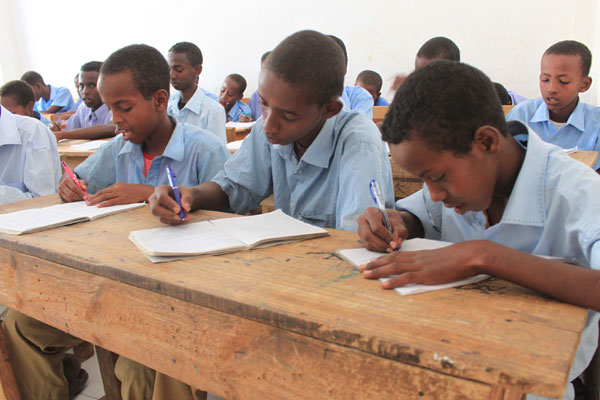In remarkable turnaround, Mogadishu moves to provide free education in decades


Extremely high rates of poverty in communities across Somalia make it difficult for parents to afford school fees. In many areas, parents are required to pay for their children’s education, and poverty remains the main reason they give for not sending their children to school.
NAIROBI –Prior to 1990s, education was a thriving sector in Somalia, thanks to the then functioning central government which provided free education. But after the collapse of the state overthrown by warlords followed by over two decades of bloody conflict, the education has fast become a casualty of the civil war.
Learning opportunities havesince deteriorated, forcing many children, mostly from poor backgrounds whose parents could not afford the fees for the usually expensive private education to drop out of schools, leaving them in dark.
Multiple attempts by previous government to improve access to the education have since failed, making the idea of free education more fanciful than pragmatism. However, the answer to this challenge is practically unfolding in the Somali capital.
Mogadishu’s local government is set to roll out a new free education programme which seeks to ensure that children from poor homes whose parents cannot afford to take them to the costly private schools acquired free and quality education in a country which has one of the world’s lowest enrolment
The scheme which is the realization of earlier promises made the Mogadishu mayor Thabit Abdi aims to provide free schooling to 10,000 students in the city’s 17 districts, an uphill task that experts say is not enough to steer young people in Somalia away from radical and violent groups such as al-Shabab and migration.
“Our aim is to have at least one public school for each of our districts, so that children have access to free education which is imperative for the advancement of our children, it is a powerful investment and speaks to public accountability” Mr. Abdi said of the new programme.
Meanwhile, the ambitious multimillion dollar project being coordinated by the Mogadishu mayor in close coordination with the United Nations High Commission for Refugees (UNHCR) has already started to take off, with the rehabilitation and furnishings schools in the city before launching the enrolment process.
THE BIG TASK
Despite the smooth start of the new free education initiative which is largely targeting returnees, IDPs and poor host community to strengthen access to primary education, experts say that developing sustainability goals for this initiative which is largely relying on foreign funding for the time being is essential to ensuring the transformation of Somalia’s education system.
Somalia rates for primary school-aged children – only 30 per cent of children are in school and only 40 per cent of these are girls. Further, only 18 per cent of children in rural households are in school.
According to UNICEF, extremely high rates of poverty in communities across Somalia make it difficult for parents to afford school fees. In many areas, parents are required to pay for their children’s education, and poverty remains the main reason they give for not sending their children to school.
However, the Mogadishu mayor remains buoyant that his efforts to improve the country’s education system which despite absence of public schools had survived political upheavals and decades of civil war, thanks to the private schools that largely filled the gap, but maintained an informal education system would pay off.
“Mogadishu’s progress in improving the overall education system is irreversible and will pay off sooner than later.” Mr. Abdi said.